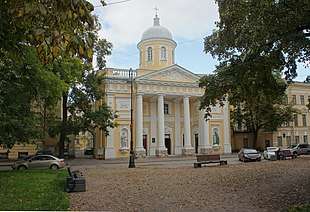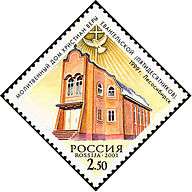Protestantism in Russia


Protestants in Russia constitute between 0.5 and 1.5%[1] (i.e. 700,000 - 2 million adherents) of the overall population of the country. By 2004, there were 4,435 registered Protestant societies representing 21% of all registered religious organizations, which is second place after Eastern Orthodoxy. By contrast in 1992 the Protestants reportedly had 510 organizations in Russia.[2]
A large number of missionaries operating in the country are from Protestant denominations.[1] According to a global survey conducted at the end of 2013, 1 % of surveyed Russians identify as Protestants.[3]
Historically speaking, Baptists have been the largest Protestant branch in Russia.
History
.jpg)
The first Protestant churches (Lutheran, Reformed) in Russia appeared in the 16th and 17th centuries in major towns and cities such as Moscow in connection with expatriate communities from western Europe. The Lutheran churches, in particular, represented a sizeable minority in pre-1917 Russia.
In the 18th century, under Czarina Catherine II (the Great), large numbers of German settlers were invited to Russia, including Mennonites, Lutherans, Reformed and also Roman Catholics.
The history of indigenous, Russian evangelical Protestantism was anticipated by movements such as the Strigolniki in the 14th century and later in the 16th-18th centuries[4] the Molokan,[5] Dukhobor,[6] to some extent, Subbotniks, and in 19th century Tolstoyan rural communes, who prepared the ground for the movement's future spread. The first evidence on some of the above communes' existence appeared in 16th - 17th centuries.[5] A large number of the above communities emigrated to Canada, the United States and Latin America in 19th and 20th centuries.
The first Russian Baptist communities arose in unrelated strains in three widely separated regions of the Russian Empire (Transcaucasia, Ukraine, and St. Petersburg) in the 1860s and 1870s.
From the information of Christian History Institute, the number of Baptists in Russia significantly grew after World War I. Some Russian prisoners were converted by German missionaries and returned home to preach to others. By 1950, there were an estimated 2,000,000 Baptists in the Soviet Union, with the largest portion in Ukraine.
Many leaders and ordinary believers of different Protestant communities fell victims to the persecution by Communist regime, including imprisonment. The leader of the Seventh-day Adventist movement in the Soviet Union Vladimir Shelkov (1895–1980) spent almost his entire life after 1931 in prison and died in a camp in Yakutia. Pentecostals were given 20-25 year prison terms en masse and many perished there, including one of the leaders of the movement, Ivan Voronaev.[7]
In the period after the Second World War, Protestant believers in the USSR (Baptists, Pentecostals, Adventists etc.) were forced into mental hospitals and endured trials and imprisonment (often for refusal to enter military service). Some were even deprived of their parental rights.[7]
Bible translation
The first attempts to translate the books of the Bible into the contemporary Russian language as an alternative to the older Church Slavonic, by that time used primarily in liturgical settings among Eastern Slavs, took place in the 16th and 17th centuries. But the mentioned works (by the deacon of Posolsky Prikaz Avraamiy Firsov, pastor E.Gluk, archbishop Methodiy (Smirnov)) were lost during political turbulence and wars.
The full-scale Bible translation into the Russian language began in 1813 after the establishment of the Russian Bible Society. The full edition of the Bible with the Old Testament and New Testament was published in 1876. This work, also called the Russian Synodal Bible, is widely used by Protestant communities all over Russia and the former USSR countries. Several modern translations have recently appeared.[8] The Russian Bible Society since its establishment in 1813 and up to 1826 distributed more than 500 thousand copies of Bible related books in 41 languages in Russia. Several times in the 19th and 20th centuries the activities of the Society were stopped due to the reactionary policies of the Russian Government.
The Russian Bible Society was reinstated in 1990-1991 after an interruption due to restrictions under the Soviet regime.[9]
The opening ceremony of the Building of the Russian Bible Society in Moscow was attended by representatives of the Orthodox, Roman Catholic, and Protestant churches, who joined efforts in the cause of Bible translation and distribution. The publications by the Russian Bible Society are based on the shared doctrine of the early Christian church and include non-confessional commentary. Over 1,000,000 Bible-related books are printed every year. The Bible is also being translated into the native languages and dialects of Russia's ethnic groups.
Present time

The major groupings of Protestants in Russia today are the Evangelical Christians — Baptists (most numerous),[10] Pentecostals/Charismatics, Adventists,[11] Lutherans (with largest churches being Evangelical Lutheran Church in Russia, Ukraine, Kazakhstan and Central Asia and the Evangelical Lutheran Church of Ingria), Presbyterians (mainly of Korean origin), Anglicans, and Restorationism (New Apostolic Church, Christadelphians, Jehovah's Witnesses, etc). Virtually all Protestant denominations are represented in the country.
Some Protestants (especially at provincial level) report encountering obstruction by local authorities of their activities and government restrictions. In April 2007, the European Court of Human Rights obliged Russian state to pay EUR 10,000 (ten thousand euros) as a non-pecuniary damage for the refusal in registration of the Moscow branch of Salvation Army. In April 2017, the Supreme Court of Russia labeled Jehovah's Witnesses an extremist organization, banned its activities in Russia and issued an order to confiscate the organization's assets.[12]
See also
References
- 1 2 US State Department Religious Freedom Report on Russia, 2006
- ↑ Protestantism in Russia, past, present, and future, Stetson University
- ↑ 2013 End of the Year Survey - Russia Archived 2016-03-04 at the Wayback Machine. WIN/GIA
- ↑ The Dukhobors and Molokans, Spirit Christian Communities in Russia, Scrollpublishing
- 1 2 Molokans around the world, Molokan web-site
- ↑ Simon Fraser University, The Doukhobor Collection, Dukhobor History
- 1 2 L.Alexeeva, chapter 13, Memorial society page, in Russian
- ↑ Russian Bible Society, in Russian
- ↑ History of Russian Bible Society, in Russian
- ↑ Russian Baptist Union web-site
- ↑ Seventh-day Adventist Church Number Two in Russia, Worldwide Faith News, August 1998
- ↑ "Russian court bans Jehovah's Witnesses as extremist". delfi.lt. Retrieved 20 April 2017.
